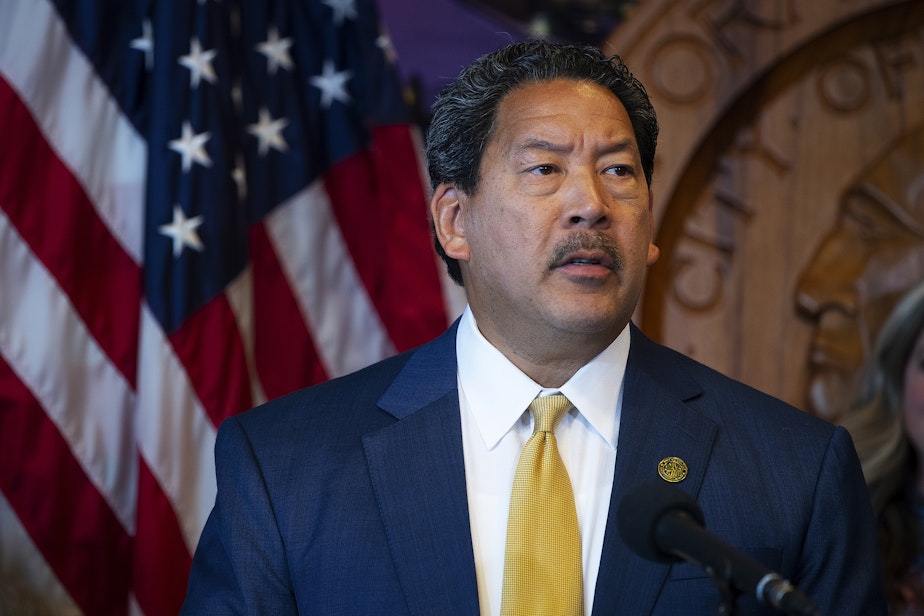Key takeaways from Mayor Harrell's upbeat 2023 State of the City address

In his second State of the City address as mayor, Bruce Harrell used the Space Needle as a metaphor to talk about his vision for the future, sounding optimistic and upbeat about the progress his administration has made and where Seattle is headed next.
But Harrell also pointed to some grim realities that the city is facing and his plans to address them. Here are the biggest takeaways from Harrell’s address.
Renewed focus on the city’s drug crisis
Last year, according to Harrell, nearly 600 people died from drug overdoses in Seattle.
“These are our sons and daughters. These are our brothers and sisters. These are moms and dads. These are people in our city. These are human beings who need treatment and care,” Harrell said.
Sponsored
Harrell said he plans to issue an executive order next month to address the city’s drug epidemic. The city will work with care providers to help people using fentanyl and other synthetic drugs get the treatment they need. The mayor also said the city will arrest and prosecute dealers.
Hotspot policing and recruiting new officers
Harrell talked about taking a more holistic approach to get at crime’s root causes, like racism and poverty, and about his commitment to police reform. But he also talked about cracking down on crime.
“We're not afraid or intimidated to enforce the law, to make arrests when people cause damage to the fabric of our neighborhoods,” Harrell said.
Crime was also a focus when Harrell announced a forthcoming “Downtown Action Plan” aimed at helping downtown Seattle businesses recover, and to make the area “safer, and more welcoming” to locals and tourists.
Sponsored
Finally, Harrell touted plans to recruit and retain more cops.
“We need more officers to address SPD’s staffing crisis, relieve pressure on current officers, and enable more tactical options, like the successful emphasis patrols on 12th and Jackson and on Third Avenue,” Harrell said.
But so far, that plan, which includes bonuses for new recruits, is not working. Seattle continues to lose more police to attrition than the department can recruit.
Seeking new solutions on homelessness
Harrell explained his “Unified Care Team” (UCT) that carries out encampment removals. Unlike the “Navigation Teams” under former Mayor Jenny Durkan, no police are involved.
Sponsored
“The UCT delivered over 1,800 referrals to shelter in partnership with contracted outreach providers — helping connect those experiencing homelessness with places to go, service resources, and pathways to recovery and permanent housing,” he said.
Harrell also said he’s delivered on promises to remove encampments from public parks.
“The number of parks and green spaces significantly impacted by encampments has been reduced by 70 percent,” he said.
The difficulty for the Harrell administration has been providing people experiencing homelessness with good alternatives and services as a part of those encampment cleanups, in part because it’s so expensive and because the city is facing looming budget deficits.
Harrell said a big part of the city's approach now is in partnership with the King County Regional Homelessness Authority, which has taken the lead for the region on the issue, with Seattle as its biggest source of funds. The Homeless Authority recently proposed a nearly $12 billion plan for housing, without a plan for how to fund it.
Sponsored
New investments and policies to create affordable housing
Harrell spoke about investments in affordable housing, including a $250 million allocation in the latest budget. According to Harrell, future changes to city zoning codes are possible to convert excess unused office space into housing. But that was the only mention of zoning in a city where around three-quarters of the land or more is still zoned single family. In keeping with his vision for the future, Harrell also spoke about the city’s next housing levy to pay for more affordable housing, which he indicated will be on the fall ballot.
“Candidly, my direction on our housing levy is simple: We must give the voters of Seattle the ambitious — and achievable — plan that lives up to the scale of the housing crisis and does more than ever to prevent homelessness,” Harrell said.
In other words, building affordable housing is expensive, and the price tag for this one could be big.
Creating good vibrations
Sponsored
Harrell talked up his "One Seattle" approach of bringing Seattleites together — despite their differences — to tackle the city’s biggest problems, from homelessness to public safety. The subtext is that city politics have become increasingly toxic in recent years, in and outside of City Hall. It’s one reason some incumbent city council members cited for not seeking re-election this year.
But under the Harrell administration, relationships between the mayor’s office and the city council have reportedly improved, and legislation and budgets are being passed, more or less collaboratively.




